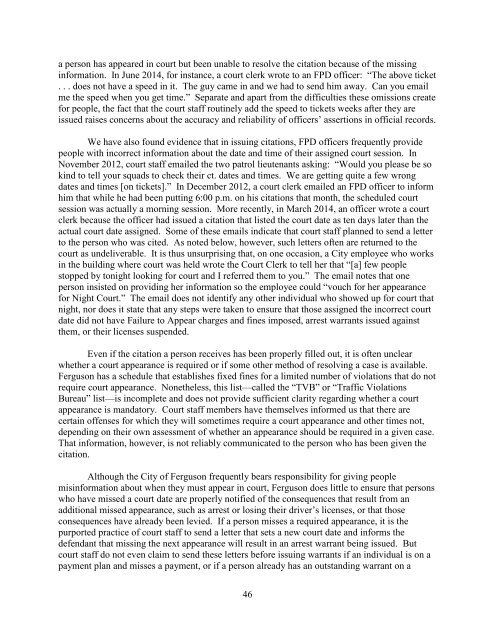U.S. Justice Department Report on the Ferguson Police Department
Ferguson’s law enforcement practices are shaped by the City’s focus on revenue rather than by public safety needs. This emphasis on revenue has compromised the institutional character of Ferguson’s police department, contributing to a pattern of unconstitutional policing, and has also shaped its municipal court, leading to procedures that raise due process concerns and inflict unnecessary harm on members of the Ferguson community.
Ferguson’s law enforcement practices are shaped by the City’s focus on revenue rather than by public safety needs. This emphasis on revenue has compromised the institutional character of Ferguson’s police department, contributing to a pattern of unconstitutional policing, and has also shaped its municipal court, leading to procedures that raise due process concerns and inflict unnecessary harm on members of the Ferguson community.
Create successful ePaper yourself
Turn your PDF publications into a flip-book with our unique Google optimized e-Paper software.
a pers<strong>on</strong> has appeared in court but been unable to resolve <strong>the</strong> citati<strong>on</strong> because of <strong>the</strong> missing<br />
informati<strong>on</strong>. In June 2014, for instance, a court clerk wrote to an FPD officer: “The above ticket<br />
. . . does not have a speed in it. The guy came in and we had to send him away. Can you email<br />
me <strong>the</strong> speed when you get time.” Separate and apart from <strong>the</strong> difficulties <strong>the</strong>se omissi<strong>on</strong>s create<br />
for people, <strong>the</strong> fact that <strong>the</strong> court staff routinely add <strong>the</strong> speed to tickets weeks after <strong>the</strong>y are<br />
issued raises c<strong>on</strong>cerns about <strong>the</strong> accuracy and reliability of officers’ asserti<strong>on</strong>s in official records.<br />
We have also found evidence that in issuing citati<strong>on</strong>s, FPD officers frequently provide<br />
people with incorrect informati<strong>on</strong> about <strong>the</strong> date and time of <strong>the</strong>ir assigned court sessi<strong>on</strong>. In<br />
November 2012, court staff emailed <strong>the</strong> two patrol lieutenants asking: “Would you please be so<br />
kind to tell your squads to check <strong>the</strong>ir ct. dates and times. We are getting quite a few wr<strong>on</strong>g<br />
dates and times [<strong>on</strong> tickets].” In December 2012, a court clerk emailed an FPD officer to inform<br />
him that while he had been putting 6:00 p.m. <strong>on</strong> his citati<strong>on</strong>s that m<strong>on</strong>th, <strong>the</strong> scheduled court<br />
sessi<strong>on</strong> was actually a morning sessi<strong>on</strong>. More recently, in March 2014, an officer wrote a court<br />
clerk because <strong>the</strong> officer had issued a citati<strong>on</strong> that listed <strong>the</strong> court date as ten days later than <strong>the</strong><br />
actual court date assigned. Some of <strong>the</strong>se emails indicate that court staff planned to send a letter<br />
to <strong>the</strong> pers<strong>on</strong> who was cited. As noted below, however, such letters often are returned to <strong>the</strong><br />
court as undeliverable. It is thus unsurprising that, <strong>on</strong> <strong>on</strong>e occasi<strong>on</strong>, a City employee who works<br />
in <strong>the</strong> building where court was held wrote <strong>the</strong> Court Clerk to tell her that “[a] few people<br />
stopped by t<strong>on</strong>ight looking for court and I referred <strong>the</strong>m to you.” The email notes that <strong>on</strong>e<br />
pers<strong>on</strong> insisted <strong>on</strong> providing her informati<strong>on</strong> so <strong>the</strong> employee could “vouch for her appearance<br />
for Night Court.” The email does not identify any o<strong>the</strong>r individual who showed up for court that<br />
night, nor does it state that any steps were taken to ensure that those assigned <strong>the</strong> incorrect court<br />
date did not have Failure to Appear charges and fines imposed, arrest warrants issued against<br />
<strong>the</strong>m, or <strong>the</strong>ir licenses suspended.<br />
Even if <strong>the</strong> citati<strong>on</strong> a pers<strong>on</strong> receives has been properly filled out, it is often unclear<br />
whe<strong>the</strong>r a court appearance is required or if some o<strong>the</strong>r method of resolving a case is available.<br />
Fergus<strong>on</strong> has a schedule that establishes fixed fines for a limited number of violati<strong>on</strong>s that do not<br />
require court appearance. N<strong>on</strong>e<strong>the</strong>less, this list—called <strong>the</strong> “TVB” or “Traffic Violati<strong>on</strong>s<br />
Bureau” list—is incomplete and does not provide sufficient clarity regarding whe<strong>the</strong>r a court<br />
appearance is mandatory. Court staff members have <strong>the</strong>mselves informed us that <strong>the</strong>re are<br />
certain offenses for which <strong>the</strong>y will sometimes require a court appearance and o<strong>the</strong>r times not,<br />
depending <strong>on</strong> <strong>the</strong>ir own assessment of whe<strong>the</strong>r an appearance should be required in a given case.<br />
That informati<strong>on</strong>, however, is not reliably communicated to <strong>the</strong> pers<strong>on</strong> who has been given <strong>the</strong><br />
citati<strong>on</strong>.<br />
Although <strong>the</strong> City of Fergus<strong>on</strong> frequently bears resp<strong>on</strong>sibility for giving people<br />
misinformati<strong>on</strong> about when <strong>the</strong>y must appear in court, Fergus<strong>on</strong> does little to ensure that pers<strong>on</strong>s<br />
who have missed a court date are properly notified of <strong>the</strong> c<strong>on</strong>sequences that result from an<br />
additi<strong>on</strong>al missed appearance, such as arrest or losing <strong>the</strong>ir driver’s licenses, or that those<br />
c<strong>on</strong>sequences have already been levied. If a pers<strong>on</strong> misses a required appearance, it is <strong>the</strong><br />
purported practice of court staff to send a letter that sets a new court date and informs <strong>the</strong><br />
defendant that missing <strong>the</strong> next appearance will result in an arrest warrant being issued. But<br />
court staff do not even claim to send <strong>the</strong>se letters before issuing warrants if an individual is <strong>on</strong> a<br />
payment plan and misses a payment, or if a pers<strong>on</strong> already has an outstanding warrant <strong>on</strong> a<br />
46

















